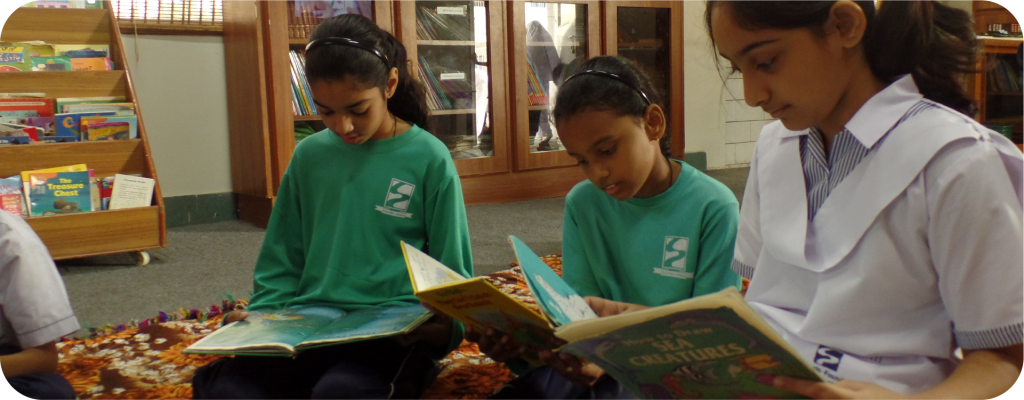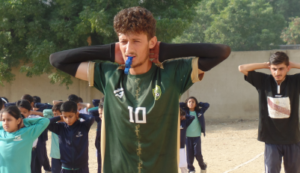At Sadequain Foundation School (SFS), we believe that experiential learning is a key component in fostering holistic development in students. Unlike traditional methods that focus purely on theoretical knowledge, experiential learning emphasizes hands-on experiences that allow students to engage with real-world scenarios. This approach not only enhances academic learning but also nurtures critical thinking, problem-solving, and practical skills that students can apply in their everyday lives.
Here’s a look at the benefits of experiential learning and how SFS integrates it into our teaching pedagogy.

1. Enhances Real-World Understanding
Experiential learning at SFS enables students to connect theory with practice. Instead of just reading about concepts in textbooks, students engage in activities that allow them to experience and apply the knowledge they gain in real-world situations. Whether it’s through field trips, hands-on experiments, or community projects, students experience first-hand what they learn in the classroom, which deepens their understanding and retention of the subject matter.
- Field Trips & Excursions: Students visit various places, such as museums, factories, or historical sites, where they observe real-world applications of their academic studies.
- Practical Applications: Activities like science experiments or social studies simulations give students the opportunity to test out concepts they’ve learned in a tangible way.
This approach makes learning more relevant and meaningful, bridging the gap between classroom lessons and real-life scenarios.
2. Fosters Critical Thinking and Problem-Solving Skills
Experiential learning encourages students to think critically and solve problems on their own. At SFS, students are not just passive recipients of knowledge—they are active participants in the learning process. Through project-based learning, group discussions, and hands-on tasks, students are challenged to think critically, analyze situations, and find solutions.
- Problem-Solving: Students tackle real-world problems, work in teams, and come up with innovative solutions.
- Critical Thinking: By reflecting on their experiences and the decisions they make, students learn to think more deeply about the consequences of their actions and ideas.
These activities help develop important life skills such as decision-making, critical thinking, and adaptability, preparing students for the challenges they will face in the future.
3. Promotes Collaboration and Teamwork
One of the core principles of experiential learning at SFS is the emphasis on collaboration. Whether working in small groups or as part of larger teams, students engage in projects that require effective communication and teamwork. This collaborative approach not only builds strong relationships among peers but also develops key interpersonal skills that are essential in both academic and professional settings.
- Teamwork: Students learn to respect different viewpoints, share responsibilities, and achieve common goals as a group.
- Communication Skills: Through collaborative projects and discussions, students improve their ability to articulate ideas, listen to others, and work together effectively.
Through these experiences, students gain the soft skills necessary to succeed in today’s team-oriented world.
4. Boosts Engagement and Motivation
When students engage in experiential learning, they are more motivated and excited about their education. By participating in hands-on activities, field visits, and real-world experiences, students see the relevance of their lessons, which increases their enthusiasm for learning. This type of active learning keeps students more engaged and reduces feelings of boredom or disconnection from the material being taught.
- Real-Life Relevance: Experiencing learning outside of the classroom helps students see how their education applies to the world around them.
- Increased Enthusiasm: The excitement of participating in engaging, interactive learning activities increases students’ curiosity and encourages them to take an active role in their education.
SFS’s commitment to experiential learning ensures that students are not just memorizing information—they are actively engaging with the material and enjoying the learning process.
5. Builds Self-Confidence and Independence
Experiential learning provides students with opportunities to take initiative and make decisions, which helps build their self-confidence. At SFS, we believe in encouraging students to take responsibility for their own learning. Whether it’s leading a project, conducting research, or presenting their findings, students gain a sense of accomplishment and pride in their work.
- Leadership Opportunities: Students take on leadership roles in group projects or presentations, helping to build their confidence in their abilities.
- Independence: Hands-on learning allows students to take ownership of their tasks, fostering a sense of independence and self-reliance.
These opportunities help students develop a strong sense of self-esteem and prepare them to take on leadership roles in both their academic and personal lives.
6. Prepares Students for Future Success
Experiential learning at SFS isn’t just about academic success—it’s about preparing students for life. By giving students the chance to apply their learning in real-world situations, we are equipping them with the skills they need to succeed in the future. From communication skills and problem-solving abilities to teamwork and creative thinking, these are the competencies that today’s employers seek.
- Career Readiness: Through hands-on experiences, students develop a range of practical skills that are transferable to their future careers.
- Adaptability: Experiential learning teaches students to think on their feet, adapt to new situations, and handle unexpected challenges with ease.
SFS’s experiential learning approach ensures that students are well-equipped for success in higher education and the professional world.
Conclusion
At Sadequain Foundation School, experiential learning is at the heart of our teaching pedagogy. By emphasizing real-world applications, critical thinking, collaboration, and independence, we ensure that our students gain not only academic knowledge but also the essential life skills that will help them succeed in the future. Through hands-on learning experiences, SFS fosters a love for learning, promotes engagement, and prepares students for the challenges and opportunities ahead.
By integrating experiential learning into every aspect of our curriculum, we empower our students to become well-rounded individuals who are prepared for success in both their academic and personal lives.



